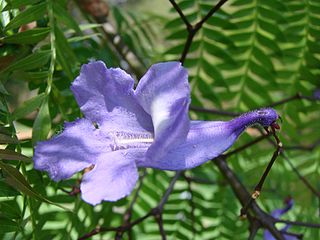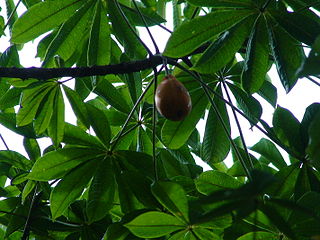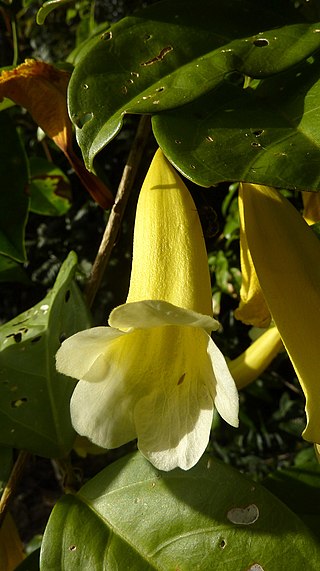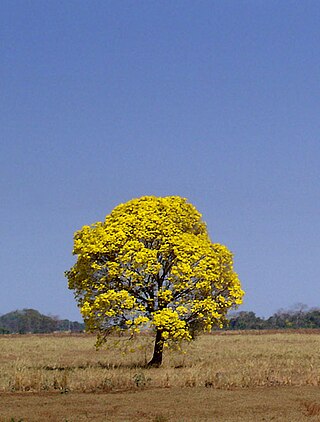
Bignoniaceae is a family of flowering plants in the order Lamiales commonly known as the bignonias or trumpet vines. It is not known to which of the other families in the order it is most closely related.

Jacaranda is a genus of 49 species of flowering plants in the family Bignoniaceae, native to tropical and subtropical regions of the Americas while cultivated around the world. The generic name is also used as the common name.

Bignonia is a genus of flowering plants in the family Bignoniaceae. Its genus and family were named after Jean-Paul Bignon by his protégé Joseph Pitton de Tournefort in 1694, and the genus was established as part of modern botanical nomenclature in 1753 by Carl Linnaeus. Species have been recorded from the southern USA, Central to most of South America.

Allophylus is a genus within the plant family Sapindaceae. It includes 211 species with a pantropical distribution.

Amphitecna is a genus of plants in the family Bignoniaceae.
Otoba is a genus of trees in family Myristicaceae that ranges from Nicaragua to Bolivia.

Jacaratia is a genus of shrubs or trees in the family Caricaceae. They are native to South and Central America.

Anemopaegma is a genus of flowering plants in the family Bignoniaceae. Species of Anemopaegma along with many other unrelated plants go by the name of catuaba.

Alwyn Howard Gentry was an American botanist and plant collector, who made major contributions to the understanding of the vegetation of tropical forests.

Mansoa is a genus of tropical, flowering vines in the family Bignoniaceae.

Handroanthus is a genus of flowering plants in the family Bignoniaceae. It consists of 30 species of trees, known in Latin America by the common names poui, pau d'arco, or ipê. The latter sometimes appears as epay or simply ipe (unaccented) in English. The large timber species are sometimes called lapacho or guayacan, but these names are more properly applied to the species Handroanthus lapacho and Handroanthus guayacan, respectively.

Amphilophium is a genus of flowering plants in the family Bignoniaceae, native to South America. Amphilophium crucigerum has escaped from cultivation elsewhere, and has become an invasive weed in Australia.
Fridericia elegans is a species of plants in the family Bignoniaceae. It is found in Brazil, where it is poisonous to livestock and has caused severe losses.

Dolichandra is a genus of flowering plants in the family Bignoniaceae, native to Latin America and the Caribbean. They are climbing lianas with trifid and uncate tendrils. The best-known species is Dolichandra unguis-cati.
Xylophragma is a genus of flowering plants in the family Bignoniaceae, native to dry forests of Mexico, Central America, Trinidad and northern South America. They are lianas or scandent shrubs.

Heterophragma is a genus of two species of tree, constituting part of the plant family Bignoniaceae. The species are found in Southeast Asia and India.
Pachyptera is a genus of flowering plants belonging to the family Bignoniaceae.

Martinella is a genus of flowering plants belonging to the family Bignoniaceae. It is a genus of Neotropical lianas within the tribe Bignonieae.

Amphilophium crucigerum is a species of flowering plant in the family Bignoniaceae, native from Mexico through Central America into South America as far south as Argentina. It was first described by Carl Linnaeus in 1753. The synonym Pithecoctenium crucigerum has often been used.
Adenocalymma arthropetiolatum is a species of flowering plant in the family Bignoniaceae, native to Panama and northwestern Colombia. A liana, it is found growing from sea level to 100 m (330 ft) in elevation.














